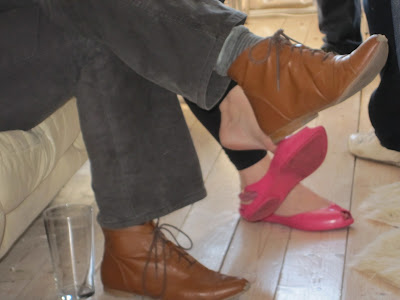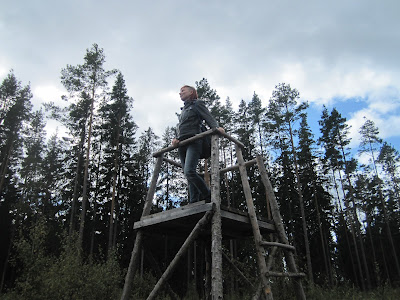The deeper I get
into my
Swenglish project, the more decisions I have to make. I've realised
it’s not just about choosing between Sweden and England. There are other things
to consider: work or study? Single life or partner/family life? City or
countryside? Trees or seas? In the picture I'm not looking for water - I'm up in a hunting tower that people use to spot elks!
This week I’m
staying deep in the forests in the county of Småland near the area where I grew
up. When I was nineteen I hated the darkness, the tall oppressive tress and the
silent lakes – I wanted to get away and see some ”real” life: concrete and
traffic and a general ugliness that would match my mood. (I've never lived permanently in the
countryside though, just in a small town, surrounded by forest.)
I escaped to
England and ended up in Portslade – at the outskirts of Brighton – and found it
very romantic with the industrial port and its cargo ships. Boundary Road was
bleak: a place where pasty pale people devoured their fish and chips (I pronounced it
”ships” at the time) with their fingers. But Brighton was only a bus ride away and I
fell in love with the sea and the hippified punks who hung out in the North
Laines.

For years I preferred the sea to the forest, but now I've changed my mind. The most
beautiful landscape I know is the countryside of Småland. Staying here makes me
calm and creative. The other day my host practiced her guitar in the garden and
I lay on the lawn among the fallen leaves and wrote poetry, listening to the
buzzing bees. However, a sunny week in the beginning of autumn isn't the same
as a grey week in winter when it’s too cold to go outside and the road is a mush of
slush. How long would it take before I got bored and restless? How long before I longed for the seafront in Hove? (Where it’s sometimes warm
enough to have a cup of tea on the beach in January.) My dream is to live by a forest
lake in Småland in summer and by the sea in Brighton in winter. Or ideally
spend the spring and autumn in Brighton and live somewhere truly warm like
Thailand in winter.

Another thing I've been pondering – this blog post is rather long, it seems like there’s more
time in the countryside – is whether you always yearn for the landscape of your
childhood at some point. I read an article about an old Greek in a Swedish rest home who was watching the sun go down behind the trees, but still imagined
that the sun was setting in the sea on the Greek island where he grew up. I
think that if I died in a deckchair on Brighton pier I’d dream of the Swedish
forest, and if I died sitting under a tree in Småland I’d dream of the English
channel.
The view from my bedroom window is of a 13th century church with a graveyard. There's also a tractor and some cows if I crane my neck. And in the room next door is a rehearsal studio. The countryside is not dead!

















